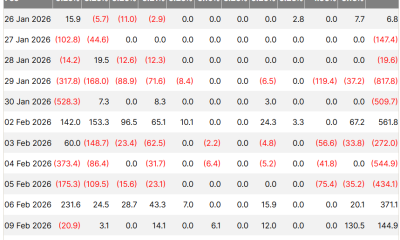- Growing AI fears recently triggered a sharp sell-off across software stocks
- SaaS valuations dropped as disruption narratives gained momentum
- AWS revenue growth outpaced broader tech market performance, and CEO looks to allay fears
Technology stocks have struggled in 2026 as investors reassess the commercial impact of rapidly advancing AI tools.
The pullback has been especially sharp among software-as-a-service companies, where some analysts now describe the downturn as an “SaaS apocalypse.”
The iShares Expanded Tech-Software Sector ETF has fallen about 24% this year, marking one of its weakest performances since 2022.
Investors react to AI shockwaves
This sell-off followed a wave of new AI features released by major model developers, including OpenAI and Anthropic.
Investors appear concerned that AI systems could compress margins, reduce demand for traditional subscription products, or shift spending toward infrastructure providers instead of application vendors.
The market reaction suggests that expectations of disruption are being priced in aggressively, even as the company’s financial results remain relatively stable.
Amazon Web Services chief executive Matt Garman has now publicly argued the market response may be disproportionate.
“Look, my own opinion is that much of the fear is overblown,” Garman told CNBC, maintaining customers will require increasing amounts of computing power and infrastructure regardless of how they integrate AI into their operations.
In Garman’s view, companies may build their own systems, rely on SaaS providers, or combine both approaches, yet the underlying demand for cloud capacity is expected to expand.
Amazon recently reported AWS revenue rose around 24% year over year to $35.6 billion in the fourth quarter, exceeding analyst estimates. Its operating margins hit 35%, slightly higher than the previous quarter.
These figures suggest cloud infrastructure spending has not slowed in tandem with the broader equity decline.
Some large software companies have introduced AI-driven features without experiencing dramatic acceleration in revenue growth.
ServiceNow reported fourth-quarter revenue growth of 20.7%, compared with nearly 26% 2 years earlier.
The deceleration does not necessarily indicate deterioration, yet it has fueled concerns that AI enhancements may not immediately translate into faster expansion.
AI is “a huge disruption…a disruptive force that’s going to change how software is consumed and how it’s built,” Garman added.
SaaS and large players may have structural advantages, but Garman believes that they, “have to innovate, just like the rest of the world. They can’t stand still. If they stand still, they’re absolutely going to be disrupted.”
Markets often react sharply to technological change, yet the gap between expectation and measurable impact remains uncertain at this stage.
Follow TechRadar on Google News and add us as a preferred source to get our expert news, reviews, and opinion in your feeds. Make sure to click the Follow button!
And of course you can also follow TechRadar on TikTok for news, reviews, unboxings in video form, and get regular updates from us on WhatsApp too.




































































